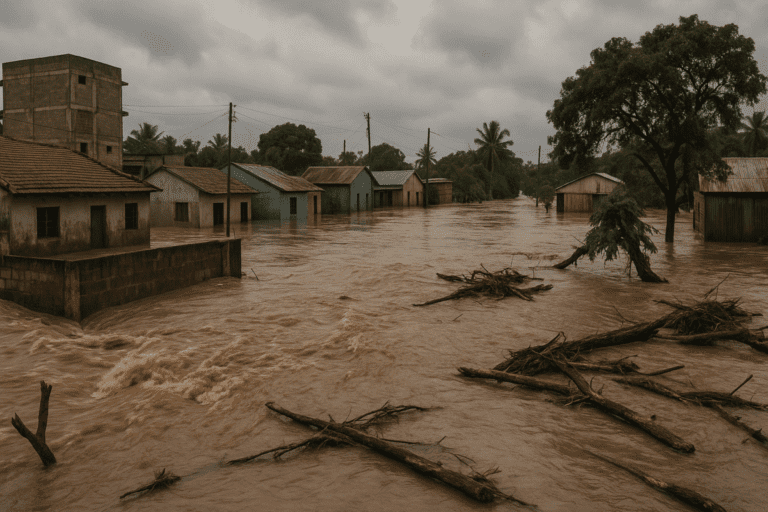Severe flooding in April 2024 wreaked havoc in Brazil and Kenya, leaving behind a trail of destruction, loss of life, and shattered communities. In Brazil’s southern state of Rio Grande do Sul, relentless heavy rains caused rivers to breach their banks, submerging entire neighborhoods. Dozens lost their lives as floodwaters rose swiftly, forcing residents to seek refuge on rooftops while awaiting rescue. The floods displaced thousands, devastated homes, infrastructure, and farmland, and overwhelmed emergency services struggling to keep pace with the crisis.
Meanwhile, in Kenya near Mai Mahiu town, the extreme weather triggered the collapse of a railway embankment, derailing multiple trains and causing catastrophic damage. The tragedy claimed at least 50 lives, with 84 more reported missing as search and rescue efforts continued. This infrastructure failure raised urgent concerns about Kenya’s resilience in the face of increasingly erratic weather patterns driven by climate change.
A Growing Global Climate Crisis
These tragic events in two distant parts of the world underscore the escalating threat posed by climate change, which is intensifying the frequency and severity of extreme weather disasters. Scientists warn that rising global temperatures are fueling more powerful storms, flash floods, and infrastructure vulnerabilities, disproportionately impacting vulnerable communities.
In both Brazil and Kenya, the disasters reveal critical gaps in disaster preparedness and infrastructure robustness. The overwhelmed response efforts highlight the urgent need to invest in stronger, climate-resilient infrastructure and more effective emergency management systems to reduce future risks and protect lives.
Urgent Call for Action and Resilience Building
The floods and infrastructure collapse serve as a stark reminder of the human toll exacted by a warming planet. As these communities begin the long road to recovery, the global community faces a pressing imperative: to tackle the root causes of climate change through mitigation efforts and to enhance adaptive capacities in regions most at risk.
International cooperation and sustained funding for disaster preparedness, early warning systems, and resilient infrastructure are crucial to safeguarding vulnerable populations. These tragedies also emphasize the need for climate justice, ensuring that those who contribute least to global emissions are not disproportionately burdened by its impacts.
The 2024 floods in Brazil and Kenya poignantly illustrate the growing urgency to act decisively against climate change. Strengthening resilience and promoting sustainable development are vital steps toward preventing further loss and helping communities withstand the mounting challenges of a rapidly changing world.


